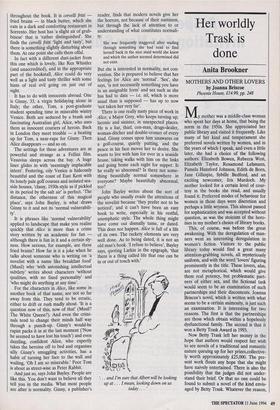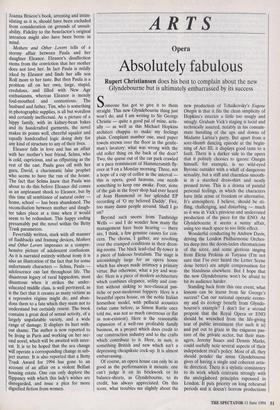Her worldly Trask is done
Anita Brookner
MOTHERS AND OTHER LOVERS by Joanna Briscoe Phoenix House, £14.99, pp. 248 My mother was a middle-class woman who spent her days at home, that being the norm in the 1950s. She appreciated her public library and visited it frequently. Like many of her kind and temperament she preferred novels written by women, and in the years of which I speak, and even a little later, she had a choice of the following authors: Elizabeth Bowen, Rebecca West, Elizabeth Taylor, Rosamond Lehmann, Pamela Hansford Johnson, Edith de Born, Jane Gillespie, Sybille Bedford, and an exciting newcomer, Iris Murdoch. My mother looked for a certain level of cour- tesy in the books she read, and usually found it. Preferred modes of behaviour for women in those days were discretion and perhaps a little wryness. This almost passed for sophistication and was accepted without question, as was the stoicism of the hero- ines in my mother's choice of library books.
This, of course, was before the great awakening. With the deregulation of man- ners went an interesting deregulation in women's fiction. Visitors to the public library today would find a great many attention-grabbing novels, all mysteriously uniform, and with the word lovers' figuring prominently in the title. These lovers, alas, are not metaphorical, which would give them real potency, but problematic part- ners of either sex, and the fictional task would seem to be an examination of such partnerships and their discontents. Joanna Briscoe's novel, which is written with what seems to be a certain animosity, is just such an examination. It is interesting for two reasons. The first is that the partnerships are those which obtain within a hopelessly dysfunctional family. The second is that it won a Betty Trask Award in 1993.
Now Betty Trask left her money in the hope that authors would respect her wish to see novels of a traditional and romantic nature queuing up for her prizes,collective- ly worth approximately £25,000. The pre- sent work flouts any hope that she might have naively entertained. There is also the possibility that the judges did not under- stand their brief. Or that no one could be found to submit a novel of the kind envis- aged by Betty Trask. Whatever the reason, Joanna Briscoe's book, arresting and intim- idating as it is, should have been excluded from consideration on grounds of unsuit- ability. Fidelity to the benefactor's original intention might also have been borne in mind.
Mothers and Other Lovers tells of a stormy affair between Paula and her daughter Eleanor. Eleanor's disaffection stems from the conviction that her mother does not love her. In fact Paula is mildly irked by Eleanor and finds her idle son Rolf more to her taste. But then Paula is a problem all on her own, large, stupid, credulous, and filled with New Age enthusiasms, whereas Eleanor is merely foul-mouthed and contentious. The husband and father, Tim, who is something in photographic supplies, is all but wordless and certainly ineffectual. As a picture of a hippy family, with its kidney-bean bakes and its handcrafted garments, the novel makes its points well, cheerful squalor and equally handcrafted logic doing duty for any kind of structure to any of their lives.
Eleanor falls in love and has an affair with her mother's best friend, Selma, who is cold, capricious, and as offputting as the rest of the cast. Paula goes off with her guru, David, a charismatic false prophet who seems to have the run of the house. The fact that Selma knew that Paula was about to do this before Eleanor did comes as an unpleasant shock to Eleanor, but by this time all semblance of natural order home, school — has been abandoned. The reconciliation between mother and daugh- ter takes place at a time when it would seem to be redundant. This happy ending presumably put the novel within the Betty Trask parameters.
Feverishly written, stark with all manner of flashbacks and framing devices, Mothers and Other Lovers impresses as a compre- hensive picture of adolescent confusions. As it is narrated entirely without irony it is also an illustration of the fact that for some unfortunate characters — Selma, Paula adolescence can last throughout life. The disastrous legacy of rural hippiedom, most disastrous when it strikes the under- educated middle class, is well portrayed, as is the fact that it creates as many victims as a repressive regime might do, and aban- dons them to a fate which they seem not to understand but certainly resent. The book contains a great deal of sexual activity, of a largely unpalatable variety, and a wide range of damage. It displays its hurt with- out shame. The author is now reported to be living in Paris and working on her sec- ond novel, which will be awaited with inter- est. It is to be hoped that the sea change will operate a corresponding change in sub- ject matter. It is also reported that a Betty Trask Award for 1994 has gone to an account of an affair on a violent Belfast housing estate. One can only deplore the flippancy with which this lady's wishes are disregarded, and issue a plea for more dignified fiction from women.



































































 Previous page
Previous page